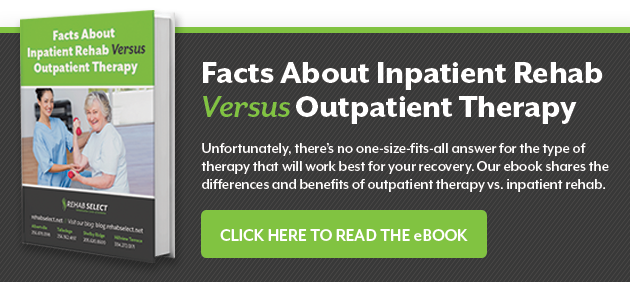
Breathing problems are a common symptom for people with COPD, and so are the hospitalizations and readmissions that often result from such alarming symptoms. However, hospital stays can be quite costly and disruptive to your life. Because of this, you likely try to avoid hospitalization whenever possible.
Although COPD is one of the leading causes of hospital readmission, there are strategies you can put in place to reduce your chances of landing back in the hospital. Let’s look at some of the causes of COPD hospitalizations and readmissions and the strategies you can use to circumvent them - specifically post-acute care.
Reasons for COPD Hospitalization
COPD causes nearly 700,000 hospitalizations in the US every year due to the nature of the condition. It can make you feel like you’re breathless, whether from a respiratory infection or a flare-up, so it’s understandable why so many patients with COPD end up in the ER. The correlation between COPD and frequent hospitalizations has to do with:
- Severity of the disease: The more severe your COPD, the higher your risk for hospitalization or readmission due to complications.
- COPD exacerbation: COPD flare-ups that cause the onset of disturbing symptoms.
- Lack of patient adherence: Smoking, not following dietary guidelines, forgetting medication, and forgoing rehab can worsen symptoms.
- Lack of specialized care: Inefficient treatment plans may not be enough.
- Comorbidities: Other health conditions may affect COPD and vice versa.
Reasons for COPD Hospital Readmission
With 10%-20% readmissions occurring within the first 30 days, COPD has one of the highest readmission rates of any other condition. Similar to the reasons for the original hospitalizations, the severity of the condition and not complying with treatment are a few of the top reasons for hospital readmission. Some other factors that influence hospital readmission rates include:
- Quality of care delivered: symptoms may not improve with poor or inadequate care
- Poor transition of care: uncoordinated treatment plans and lack of follow-up care may leave you with no choice but to return to the hospital
- Lack of effective COPD-specific programs: basic or generalized treatment plans may be ineffective for patients with COPD
- Patient adherence: not following your doctor’s orders could result in poor recovery
How to Lower Your Odds of Hospitalization and Readmission
Now that you understand why hospitalizations and readmissions are so high for patients with COPD, you can make efforts to address the reasons you have control over. These recommendations may reduce the chances of you or your loved one ending up back in the hospital:
- Follow your doctor’s recommendations for oxygen timing, inhaler use, diet, and lifestyle factors. Following all the recommendations together should have a noticeable positive impact on your condition.
- Quit smoking. Quitting smoking is one of the best changes you can make for your health if you have COPD. Quitting prevents smoking-related exacerbation and further damage to your lungs caused by cigarettes.
- Get vaccinated. Upper respiratory infections and viruses are some of the leading causes of COPD exacerbation. The flu and pneumococcal vaccines help prevent those illness-related exacerbations.
- Book a timely follow-up with your doctor. Early follow-ups with your doctor or specialist are important soon after hospitalization. Having a discharge and transition care plan in place can help prevent further hospitalizations.
- See a specialist. Pulmonary specialists and respiratory therapists offer the most targeted treatment for COPD. Pulmonary rehab can reduce readmissions by over half and make it easier to manage the condition, so it’s essential to start as soon as possible. If the hospital doesn’t mention specialized care, ask for a referral.
- Create a self-directed COPD response plan. Work with your doctors to come up with a self-managed COPD care plan, so you know how to treat yourself and respond to your symptoms. For example, you may make a plan to pinpoint and avoid your triggers or create a chart to determine when it’s appropriate to use your inhaler and when to call 911.
- Choose a facility that specializes in COPD. Many emergency rooms aren’t equipped with specialized knowledge or tools to care for COPD patients. Many rehab centers, on the other hand, have COPD specialists on-staff to care for you or a family member.
The Role of Post-Acute Care to Reduce Readmission
A post-acute care center is one of the best places to receive treatment for COPD. Unlike an ER or general hospital, a post-acute care center has COPD experts and equipment available on site to handle your specific symptoms. The specialists follow COPD-specific care guidelines and integrate multi-disciplinary treatments into your care plan for coexisting conditions.
Let’s say, for example, that you have diabetes and COPD. A post-acute care center like Rehab Select puts together a team of specialists who offer complementary therapies to treat both conditions. They coordinate all your therapies and appointments, so you don’t have to juggle so many appointments at various places. You can attend your pulmonary rehabilitation, dietitian sessions, and endocrinologist appointments in the same facility to obtain the best results.
Your care team uses open communication to ensure all your providers are on the same page. Rehab Select uses interprofessional teams as a successful method to enhance your recovery and prevent COPD readmissions. Their methods address all the reasons for COPD hospitalization and readmission listed above and provide a place you can turn to when your symptoms act up again.
An inpatient or outpatient post-acute care center can make a huge difference when it comes to preventing additional hospitalizations for COPD. If you or a loved one would like to look into post-acute care facilities for COPD, contact Rehab Select for more information.





